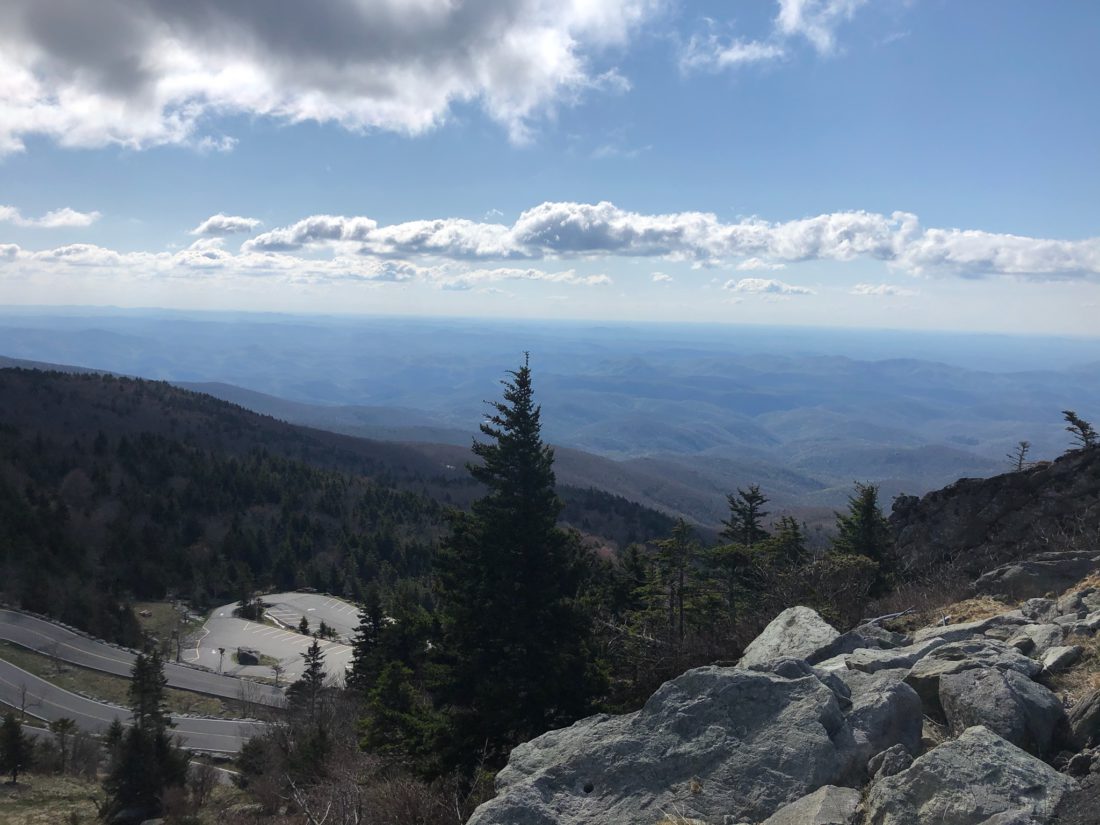In recent weeks, social media have been full of reports about nature responding to drastic cuts in human activity due to COVID-19. Wild goats are roaming through a Welsh town on lockdown, a jaguar was spotted in a closed Mexican resort — and in downtown Asheville, a black bear prowled the mostly deserted streets outside the Buncombe County administration building.
As the animal world shows striking signs of a new normal, some environmental markers are also shifting in conjunction with efforts to slow the spread of the disease. Cities such as New Delhi and San Francisco have recently seen significantly better air quality due to reduced traffic and business activity, the result of stay-at-home orders, while cuts to boat traffic in Venice have made the Italian city’s canals look crystal clear.
Are similar changes taking place in Western North Carolina? Xpress reached out to several organizations responsible for monitoring the region’s air and water to learn how the environmental situation has changed since Buncombe County issued its COVID-19 state of emergency declaration on March 12, which marked the first local guidance for people to reduce nonessential business and travel.
Blue-sky scenario?
Regarding regional air quality, the answer to the question of coronavirus’s impact is a resounding maybe. According to James Raiford, a senior air quality specialist with the WNC Regional Air Quality Agency, both ozone and particulate matter averages were indeed lower throughout Buncombe County last month than in any March for the past four years. (The federal Environmental Protection Agency only began considering March part of the ozone season in 2017).
However, Raiford cautions against drawing too strong a conclusion from those numbers. Ozone and PM measurements are highly dependent on weather, with high-pressure systems keeping pollution close to the ground and more active conditions leading to cleaner air. With only four years of data for ozone, he says, it’s difficult to tease apart COVID-19’s effects from natural variation.
“Perhaps the bigger thing to consider this year is that Duke is no longer burning coal at the Skyland plant,” Raiford continues; the coal plant was officially retired in January. “Their new natural gas-fired power plant should result in lower emissions of NOx (nitrogen oxides), which is a precursor for ozone formation, and also lower emissions of PM.”
That fuel shift is likely the biggest way WNC’s humans have changed the local air quality, Raiford suggests. While reductions in travel and business due to COVID-19 restrictions may have cut some pollution, he says the effect is probably much less than what’s been observed in more urban areas.
Anecdotally, the people who oversee one of WNC’s most famous views haven’t seen big changes since coronavirus orders took effect. John Caveny, natural resource management specialist with the Grandfather Mountain Stewardship Foundation in Linville, says visibility has followed its normal spring variation of more than 80 miles on clear days to less than 50 feet in the fog.
“The one thing that I have noticed is how much louder everything in nature has been. The songbirds seem to be singing louder, and the turkey gobbles sound like they are in a microphone,” Caveny notes. “I attribute this to two things: there being less road noise and the sounds of people throughout the park, and the lack of disturbance from the vehicles and people making the birds more active throughout the day.”
Usual flow
COVID-19 is likely not having a major effect on WNC’s waterways, according to the N.C. Department of Environmental Quality. “[The Division of Water Resources] would not anticipate discernible improvements in water quality from relatively short-term changes in human behavior, as a significant potential source of water quality impacts is from nonpoint sources (e.g., stormwater, agricultural runoff, land-disturbing activities, etc.), which have largely not been affected during the COVID-19 event,” explains spokesperson Robert Johnson.
Although empirical data is limited — Johnson references only two samples from the French Broad River taken on March 18, after Buncombe County’s emergency declaration but before its “Stay Home, Stay Safe” order took effect — those preliminary results show low turbidity and E. coli levels in line with expectations for the spring. And Hartwell Carson, French Broad Riverkeeper for Asheville-based environmental nonprofit MountainTrue, also says the virus probably hasn’t done much for water quality.
“We don’t have a lot of industry, so the temporary shuttering of industry due to the virus isn’t going to really change water quality here,” Carson says. “Most of our pollution is sewer, septic, agricultural and construction related. All of [those] things are still similar pre- and post-corona.”
Ann Marie Traylor, executive director of the Black Mountain-based Environmental Quality Institute, says her organization’s watershed sampling in April and May should provide more information about what changes, if any, COVID-19 has brought to the region. But she suggests that the biggest effects to come from the virus may not be related to the human slowdown.
“I’m also concerned about the EPA’s relaxation of regulations for industrial pollution during the health crisis,” Traylor says, referencing the agency’s March 26 move to not seek civil penalties for noncompliance with many environmental rules. “I’m not sure if we’ll be seeing any effects from that in the next month or two.”




Before you comment
The comments section is here to provide a platform for civil dialogue on the issues we face together as a local community. Xpress is committed to offering this platform for all voices, but when the tone of the discussion gets nasty or strays off topic, we believe many people choose not to participate. Xpress editors are determined to moderate comments to ensure a constructive interchange is maintained. All comments judged not to be in keeping with the spirit of civil discourse will be removed and repeat violators will be banned. See here for our terms of service. Thank you for being part of this effort to promote respectful discussion.